Key takeaways:
- Taxonomy ethics emphasizes the influence of naming and classification on conservation efforts and community connections, advocating for the incorporation of indigenous knowledge and cultural significance.
- Ethical taxonomy principles focus on fairness, inclusivity, and the recognition of historical context, aiming to challenge biases and enhance our understanding of biodiversity.
- Future trends in taxonomy ethics include the integration of technology for informed decisions, community-driven initiatives for accountability, and the establishment of a unified global ethical framework.
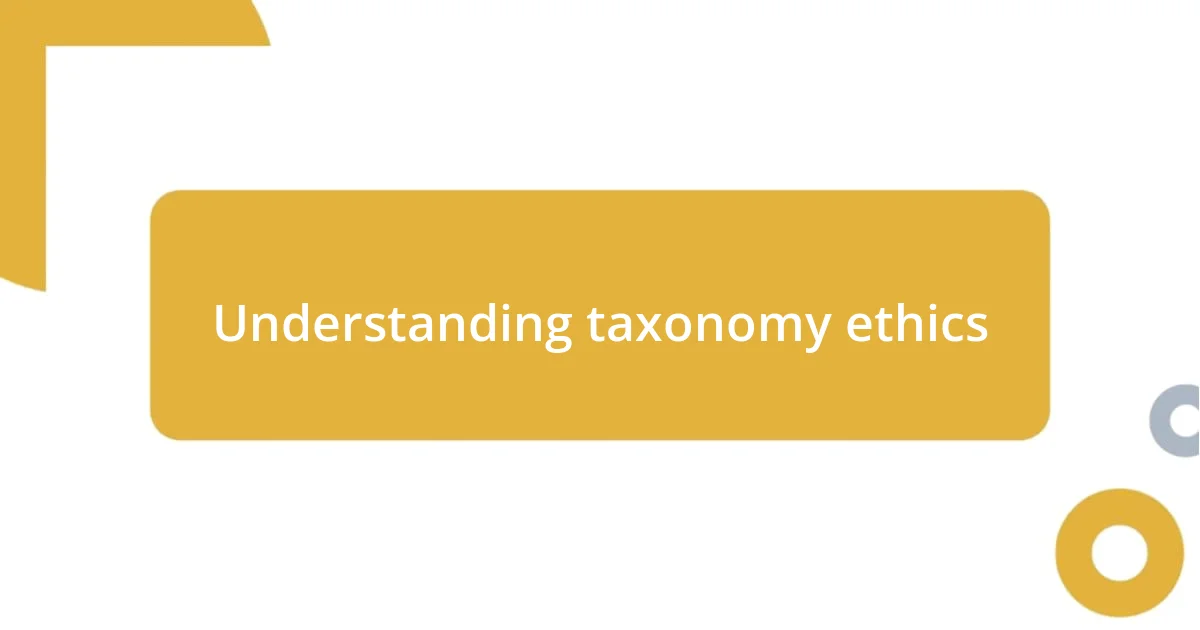
Understanding taxonomy ethics
Taxonomy ethics revolves around the moral principles guiding the classification and naming of living organisms. I often reflect on this when considering how my own understanding of the natural world shapes my perceptions. Have you ever thought about how the names we use can influence our connection to an organism? If we perceive a species as valuable or important, we are more likely to advocate for its conservation.
Diving deeper, I find that taxonomy is not just about organization, but also about representation. The way we classify species can reveal underlying biases, often reflecting a Western-centric view of nature. This especially strikes a chord with me because it reminds me of the rich diversity in cultural interpretations of the same species. When I traveled to different regions, I was amazed at how communities viewed local species through their unique lenses, each carrying its own story and significance.
Overall, understanding taxonomy ethics means recognizing the power dynamics involved in naming and classifying life. I can’t help but wonder—what responsibilities do we hold in this process? It brings to mind my experience in a local biodiversity project where we had to reconsider our classifications based on indigenous knowledge. It was enlightening to engage with the local community and learn how their names reflected their deep connection to the land, ultimately driving me to think more critically about my role in the conversation.
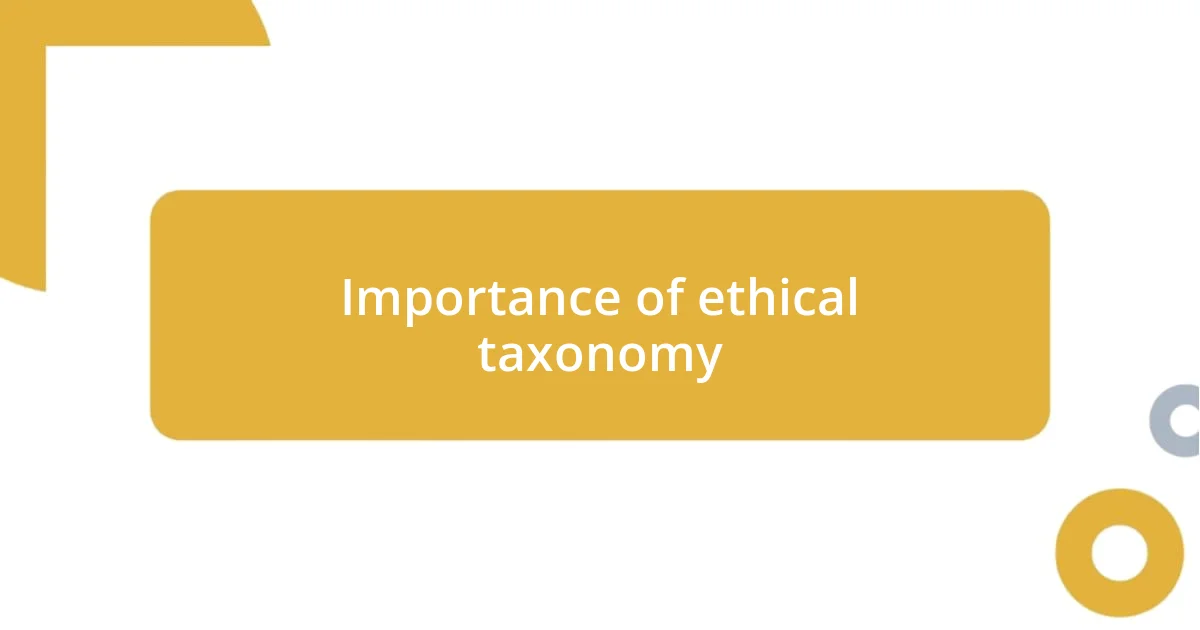
Importance of ethical taxonomy
Ethical taxonomy plays a crucial role in fostering a deeper understanding and appreciation of biodiversity. I’ve often found myself in discussions about how the labels we assign to organisms can shape perceptions and treatment of those species. For example, when I volunteered at a wildlife rehabilitation center, the way we described animals influenced people’s attitudes toward them. The exotic-sounding names drew more volunteers, but I noticed that simpler, local names resonated better with the community, creating a sense of familiarity and connection.
- Encourages respect for all forms of life
- Aids in conservation efforts by highlighting cultural significance
- Challenges biases and promotes diverse perspectives in ecological discourse
- Fosters global collaboration in biodiversity initiatives
- Enhances educational outreach through relatable classifications
Navigating the complexities of ethical taxonomy is a personal journey. I recall a moment during a nature workshop where a participant shared their family’s traditional names for local plants. It struck me how those names carried stories and histories that scientific classifications often overlooked. This experience reminded me that ethics in taxonomy is not just an academic exercise; it’s about honoring the diverse narratives that coexist within our natural world. Embracing a more inclusive approach can enhance our collective stewardship of nature and nurture a richer connection with the earth.
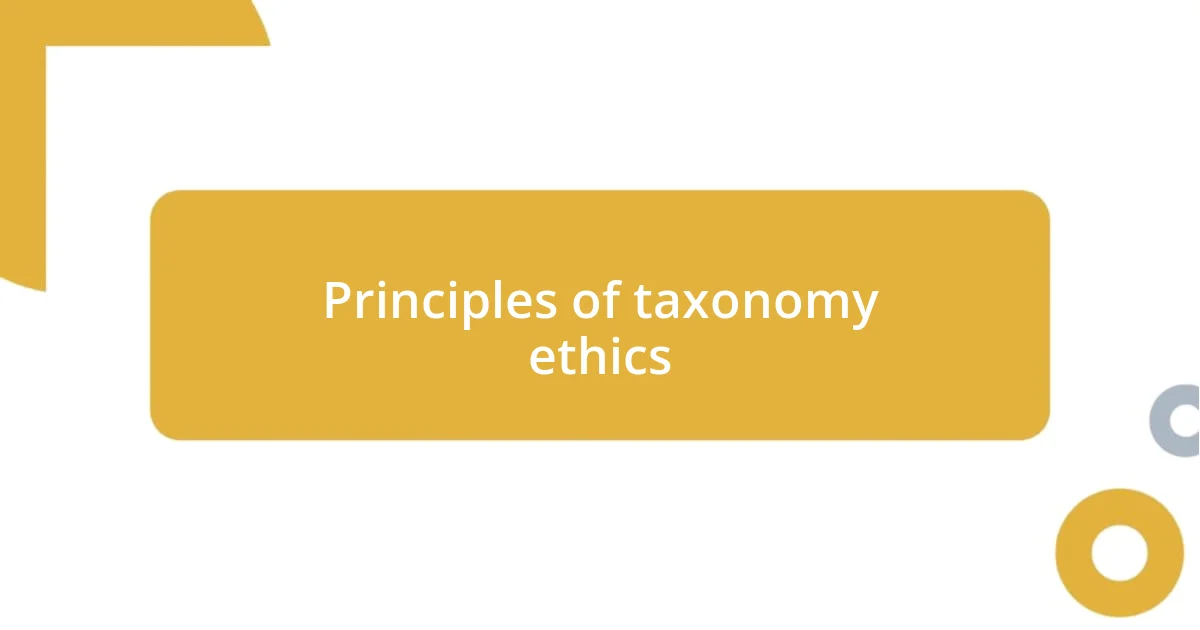
Principles of taxonomy ethics
Principles of taxonomy ethics are essential in ensuring that our classifications uphold fairness and inclusivity. It’s striking how a seemingly simple label can carry weighty implications. I once experimented with a taxonomy seminar where we re-evaluated the names of various species through the lens of ethical consideration. The experience was eye-opening; it made me realize the impact language has on our perception of biodiversity and how much thought needs to go into the names we choose.
Another crucial principle is the recognition of historical context in classification. I remember visiting a museum where a curator emphasized how colonial legacies often shaped scientific naming conventions. It made me reflect on my own ignorance regarding the stories behind those names. Compassionate naming, with an understanding of cultural contexts, can bridge divides and foster connections that science alone might miss.
To illustrate the principles of taxonomy ethics, here’s a comparison of different approaches in naming species:
| Traditional Taxonomy | Ethical Taxonomy |
|---|---|
| Focus on scientific nomenclature and classification | Incorporates cultural meanings and local knowledge |
| Often reflects a Western worldview | Seeks to challenge biases and promote diverse perspectives |
| Emphasizes organization of life | Puts emphasis on respect and representation |
| Aims for objectivity | Recognizes subjective influences and their importance |
Navigating these principles requires a shift in mindset. I often think about a conversation I had with a local environmentalist who shared how indigenous names for plants are intricately tied to their properties and uses. This reminded me that when we engage with ethical taxonomy, we open doors to knowledge and respect that enrich our understanding of the living world. It’s about taking a stance that honors not just the organisms we classify, but also the stories and relationships intertwined with them.
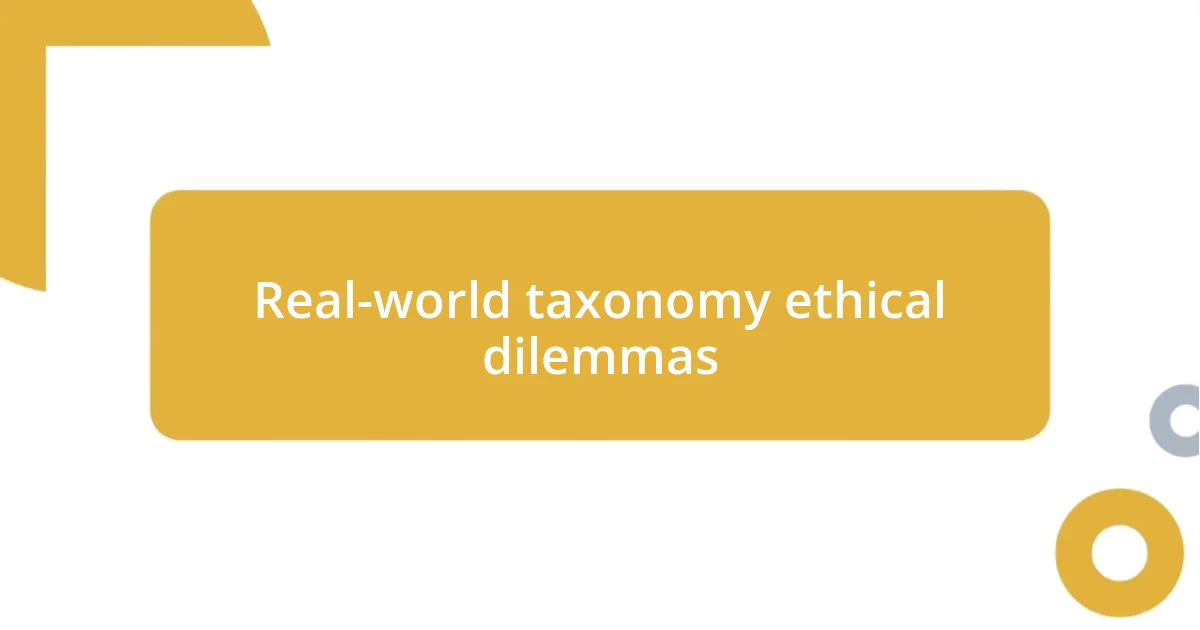
Real-world taxonomy ethical dilemmas
One ethical dilemma I often ponder is the impact of species names derived from colonial history. During a field study in a rainforest, I stumbled upon a plant species named after a colonial figure. It left me questioning: how do we reconcile our respect for biodiversity with the baggage of historical injustices? This moment was illuminating, prompting discussions among my peers about the urgency of decolonizing taxonomy. We realized that a name can evoke power dynamics that, if unaddressed, perpetuate biases against cultures that were marginalized in the process.
In another instance, while attending a biodiversity conference, I listened to a team of researchers present on the importance of indigenous knowledge for ecological conservation. They shared stories of local communities that used ancient names for animals, revealing their intrinsic relationships with the land. I couldn’t help but feel a sense of urgency to question whether our scientific classifications, which often overlook such narratives, truly serve the best interests of conservation. Isn’t it crucial to integrate these diverse perspectives to honor both nature and the wisdom people hold?
Finally, I recall an interaction with a child during a nature camp. She pointed to a butterfly and excitedly shared its local name, emphasizing how her grandmother taught her about its significance. It struck me how the importance of ethical taxonomy extends beyond academic circles. Shouldn’t we ensure that our classifications resonate within communities, fostering not just scientific understanding, but a heartfelt connection to nature? This experience resonated deeply with me, highlighting the necessity of inclusive naming practices that nurture emotional bonds with the environment.
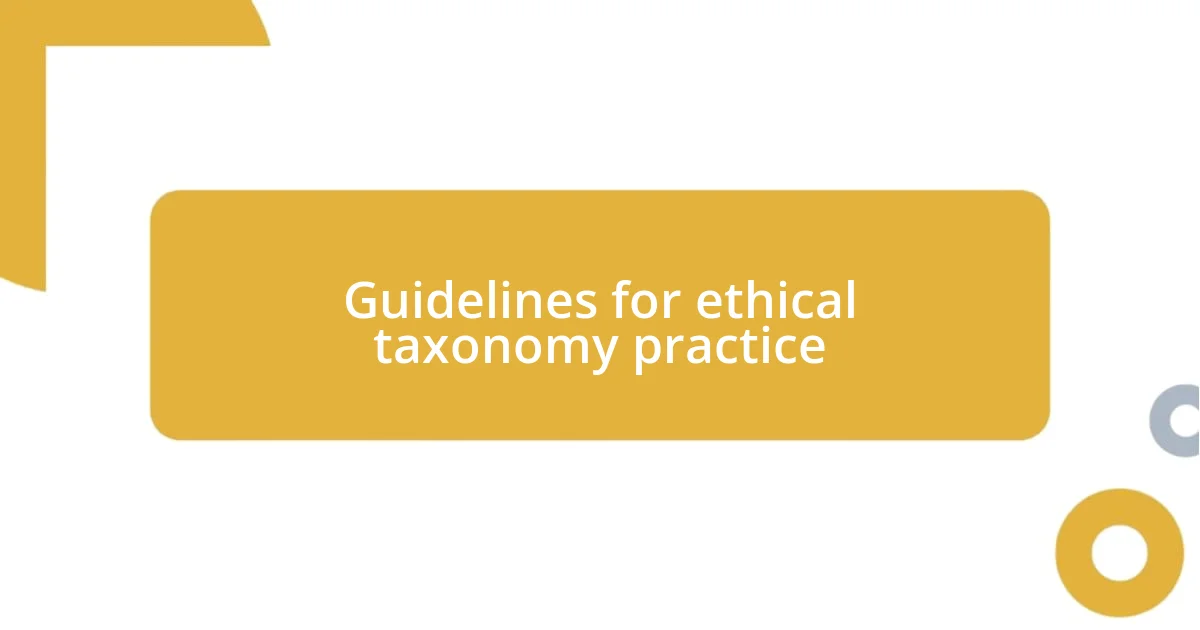
Guidelines for ethical taxonomy practice
When it comes to ethical taxonomy practices, one of the most important guidelines is to prioritize collaborative engagement with local communities. I remember attending a community workshop where we brainstormed potential names for a newly discovered species. It was fascinating to witness how traditional knowledge and local lore brought a new depth to our understanding. How can we, as taxonomists, ignore the rich narratives intertwined with these organisms? By incorporating diverse voices, we not only honor those relationships but also enrich our scientific dialogue.
Another key guideline is active reflection on our biases. I can recall a moment during a taxonomy project when a colleague suggested a name that resonated with our scientific backgrounds but overlooked cultural significance. It made me pause and realize: Are we truly representing the world as it is, or simply imposing our perspectives? This self-examination is vital; I find that it often leads to more thoughtful and equitable naming conventions.
Furthermore, transparency plays a crucial role in ethical taxonomy. In one of my discussions with fellow researchers, we agreed on the necessity of documenting our decision-making processes. After all, how can we expect to foster trust and understanding if we’re not transparent about why we choose certain names or classifications? Sharing our methods and the rationale behind our choices not only makes us accountable but also invites constructive feedback. Isn’t it essential to invite scrutiny into our work to ensure it aligns with the ethical standards we aim to uphold?
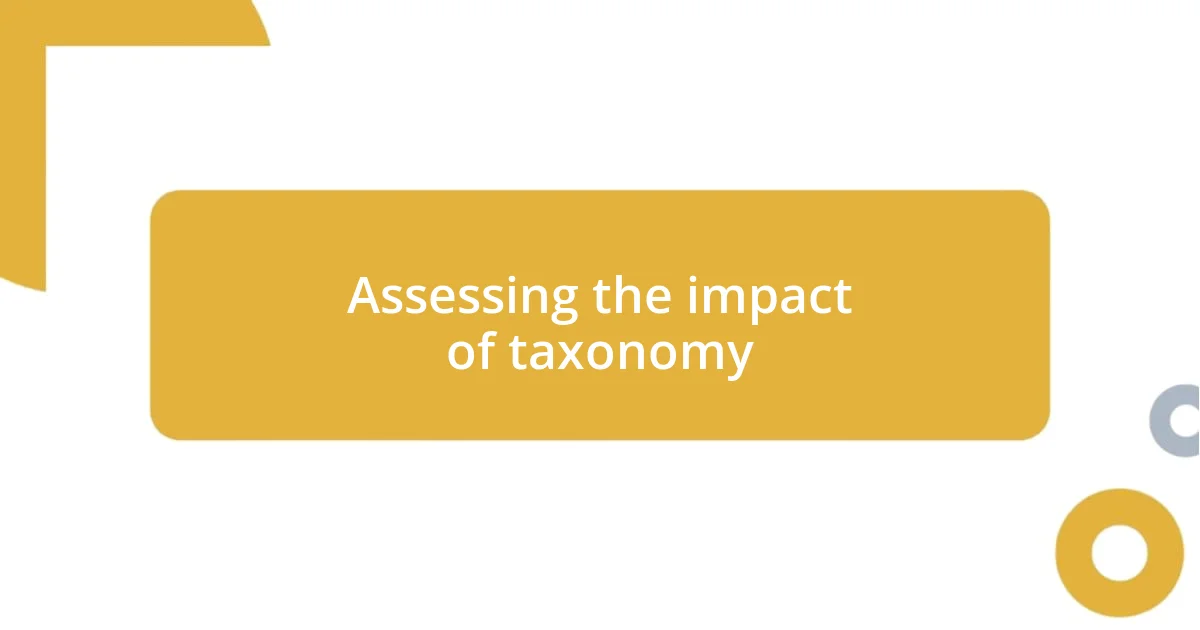
Assessing the impact of taxonomy
Assessing the impact of taxonomy goes beyond mere classification; it touches the very essence of how we relate to the natural world. One day, during a visit to a botanic garden, I overheard a family discussing the significance of each plant’s name. It struck me—every name carries a story, a cultural context that shapes our understanding and appreciation of biodiversity. How many of us realize that these labels can either bridge gaps between cultures or widen them?
Consider the ramifications of taxonomy decisions on conservation strategies. In a research project focused on endangered species, I witnessed firsthand how scientific names can influence funding and public interest. When we rebranded a species using a name that resonated with local communities, support surged. Isn’t it fascinating how a simple change in nomenclature can elevate a conservation effort? This experience opened my eyes to the profound responsibility we hold as taxonomists; our choices can significantly sway public perception and motivate action.
Moreover, the ecological impacts of taxonomy are often overlooked. I once participated in a restoration project where we grappled with identifying local flora and fauna. We realized that misclassifications had led to unsuccessful reintroduction attempts. Reflecting on this, I found myself questioning: Are we not doing a disservice to ecosystems by failing to accurately represent their inhabitants? The consequences of our taxonomic choices can ripple through time, affecting not just species survival but the entire web of life they inhabit. It’s a reminder that the stakes are high, and our role in this process is critical.
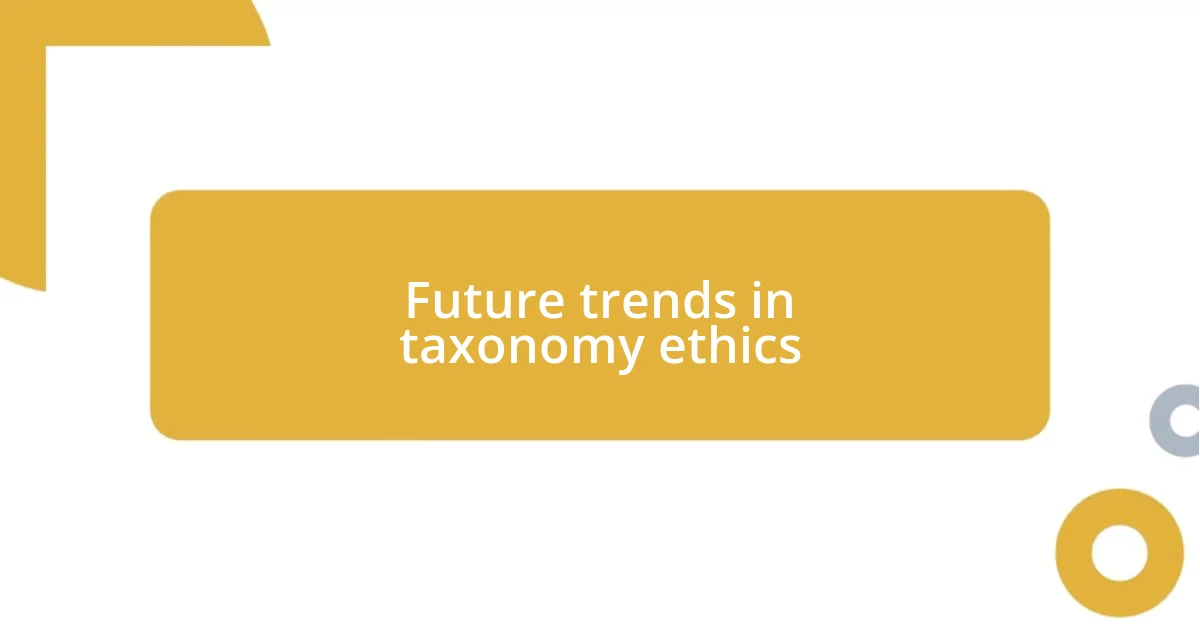
Future trends in taxonomy ethics
As I look ahead, I see an increasing focus on integrating technology into ethical taxonomy practices. Imagine using artificial intelligence to analyze the cultural implications of names before they are finalized. I can’t help but wonder how this might empower taxonomists to make better-informed decisions. During a recent conference, I encountered a fascinating presentation on AI-assisted databases, which could help balance scientific understanding with indigenous perspectives. Isn’t it exciting to think about how these tools could foster a more inclusive framework in the field?
Another trend I foresee is a shift towards greater accountability through community-driven initiatives. I recall a workshop where a group of researchers partnered with local Indigenous leaders to co-create a taxonomy framework that resonated with both scientific and cultural narratives. It struck me then—how can we expect true equity in taxonomy without relinquishing some control to those whose lives are intertwined with these species? This collaborative approach could redefine ethical standards moving forward, allowing those most affected by taxonomic decisions to have a say in the process.
Lastly, there’s an emerging emphasis on global conversations about taxonomy ethics that extend beyond local circles. After an enlightening roundtable discussion with international researchers, I felt a renewed sense of responsibility. The need for a unified ethical framework that transcends borders is becoming increasingly clear. How can we ensure that all voices are heard on a global scale? Formulating ethical guidelines that respect both local traditions and global standards may be the next pivotal step in fostering a truly ethical taxonomy.














